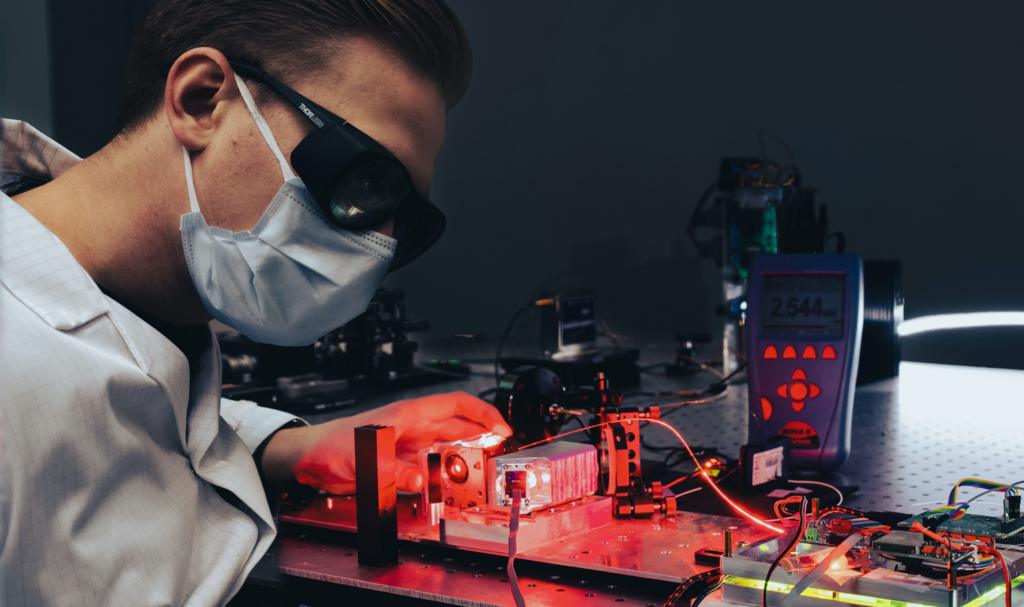Navigating a series of concrete corridors at Vilnius Tech University in Lithuania, the Soviet-era murals present an unexpected backdrop for a high-tech laboratory developing a laser communication system.
Yet, here lies the headquarters of Astrolight, a six-year-old Lithuanian space-tech startup that has recently secured €2.8m ($3.3m; £2.4m) in funding to construct what it envisions as an “optical data highway.”
This technology can be conceived as invisible internet cables, engineered to connect satellites with Earth.
With projections indicating 70,000 satellite launches in the next five years, the market holds substantial promise.
The company aims to contribute to the transition from conventional radio frequency-based communication to laser technology, which offers faster speeds, enhanced security, and higher bandwidth.
Astrolight’s space laser technology also presents potential defense applications, particularly relevant given Russia’s current assertive posture towards neighboring nations.
Astrolight is already participating in NATO’s Diana project (Defence Innovation Accelerator for the North Atlantic), an incubator established in 2023 to adapt civilian technology for defense purposes.
In Astrolight’s case, NATO seeks to utilize its rapid, secure laser communications for transmitting critical intelligence during defense operations – a capability already being implemented by the Lithuanian Navy.
The Lithuanian Navy approached Astrolight three years ago in search of a laser system enabling ship-to-ship communication during radio silence.
“We responded, ‘We know how to do it for space, and it appears we can also adapt it for terrestrial applications,'” recounts Astrolight co-founder and CEO Laurynas Maciulis, based in Vilnius.
The military finds the company’s technology attractive due to the laser system’s resistance to interception or jamming.
Mr. Maciulis emphasizes the aspect of “low detectability,” adding:
“Activating a radio transmitter in Ukraine immediately makes you a target due to ease of tracking. With this technology, information travels in a very narrow laser beam, making it very difficult to detect.”
Lithuania’s defense budget, valued at approximately £2.5 billion, is modest compared to larger nations like the UK, which allocates around £54 billion annually.
However, when evaluating defense spending as a percentage of GDP, Lithuania’s commitment surpasses that of many larger countries.
Around 3% of its GDP is allocated to defense, with plans to increase it to 5.5%. In comparison, UK defense spending constitutes 2.5% of GDP.
Recognized for its expertise in niche technologies like Astrolight’s lasers, Lithuania has secured EU funding for 30% of its space projects, exceeding the EU national average of 17%.
“Space technology is rapidly becoming an increasingly integrated element of Lithuania’s broader defense and resilience strategy,” states Šarūnas Genys of Invest Lithuania, the head of the manufacturing sector and a defense sector expert.
Space technology often serves both civilian and military purposes.
Mr. Genys cites Lithuanian life sciences firm Delta Biosciences, which is preparing a mission to the International Space Station to test radiation-resistant medical compounds.
“While developed for spaceflight, these innovations could also support special operations forces operating in high-radiation environments,” he notes.
He also mentions that Vilnius-based Kongsberg NanoAvionics has secured a significant contract to manufacture hundreds of satellites.
“While primarily commercial, such infrastructure has inherent dual-use potential, supporting encrypted communications and real-time intelligence, surveillance, and reconnaissance across NATO’s eastern flank,” Mr. Genys explains.
Complementing Astrolight’s laser technology is the autonomous satellite navigation system developed by fellow Lithuanian space-tech startup Blackswan Space.
Blackswan Space’s “vision-based navigation system” enables satellites to be programmed and repositioned independently of a human-operated ground control center, which its founders believe will be unable to manage the sheer volume of satellites launching in the coming years.
In a defense context, the same technology can be used to remotely destroy enemy satellites and to train soldiers through battle simulations.
However, Tomas Malinauskas, Blackswan Space’s chief commercial officer, acknowledges that persuading the Lithuanian military has not always been straightforward.
He also expresses concern that government funding for the sector is not keeping pace with the level of innovation emerging from it.
He suggests that instead of spending $300 million on a US-made drone, the government could invest in a constellation of small satellites.
“Build your own capability for communication and intelligence gathering of enemy countries, rather than relying on a drone that could be shot down within the first two hours of a conflict,” argues Mr. Malinauskas, also based in Vilnius.
“This would significantly boost our small space community and provide long-term, sustainable value for the future of the Lithuanian military.”
Eglė Elena Šataitė leads Space Hub LT, a Vilnius-based agency that supports space companies as part of Lithuania’s government-funded Innovation Agency.
“Our government is certainly aware of the reality of our location and the need to invest more in security and defense. We recognize that space technologies are enabling defense technologies,” says Ms. Šataitė.
The country’s Minister for Economy and Innovation, Lukas Savickas, acknowledges Mr. Malinauskas’ concern and affirms that the government is reviewing its spending on space tech development.
“Space technology is one of the highest added-value-creating sectors, known for its horizontality. Many space-based solutions align with biotech, AI, new materials, optics, ICT, and other fields of innovation,” Mr. Savickas states.
Regardless of government funding outcomes, the Lithuanian appetite for innovation remains robust.
“We always have to prove to others that we belong on the global stage,” says Dominykas Milasius, co-founder of Delta Biosciences.
“Everything we do also carries geopolitical significance. We must build up critical value offerings, sciences, and other critical technologies to ensure our allies understand the importance of protecting Lithuania.”

